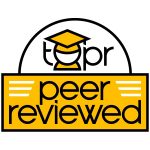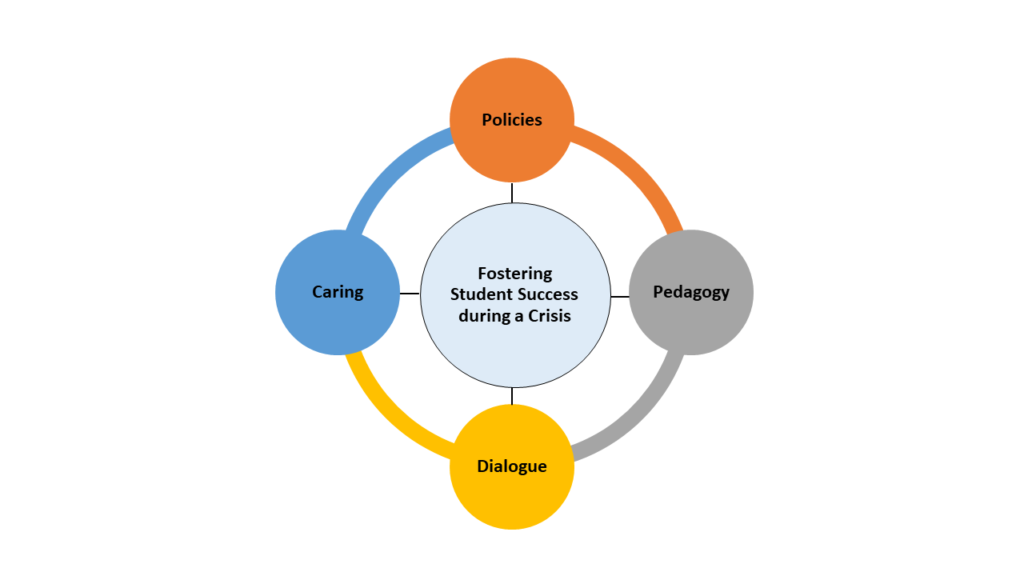
The COVID-19 pandemic presented significant challenges and stressors to students with great potential to impact their educational experience (Savitsky et al., 2020; Schiff et al., 2021), retention, and completion. The effects on mental health and function were recognized globally (Baloran, 2020). These challenges became opportunities for expanding caring approaches to students and reexamining pedagogical strategies to promote flexibility, enhance communication, and increase student support.
Online undergraduate and graduate nursing program faculty developed a Holistic Educational Model, a four-pronged approach of response that included adaptations of course policies, pedagogy, faculty-student dialogue, and intensive caring of students throughout this crisis period (Levitt et al., 2021). These approaches embrace student support as individuals and professionals, focused and sensitive communication, successful achievement of course outcomes, and program retention, and maintains the rigor of the educational experience. Several adaptations have since become permanent course policies based upon the success of the model.
Link to example artifact(s)
A Holistic Educational Model (Levitt et al., 2021), consisting of four elements (Policies-Pedagogy-Dialogue-Caring), was designed to provide the framework for accommodations to promote student well being (Figure 1).

Policies
- Reduce the number of required days per week for asynchronous participation
- Decrease the number of required peer responses in asynchronous discussions
- Establish flexible submission deadlines for assignments without penalty
- Guide students individually to create a plan for course completion such as offering an incomplete option
Pedagogy
- Restructure assignments, while preserving rigor and achievement of course learning outcomes such as:
- convert portions of scholarly writing assignments to bullets and/or table format
- move synchronous learning activities to asynchronous format
- include content relevant to the ongoing pandemic, providing students with opportunities for application, expression, and self-reflection
- use audio platforms to increase effective interaction
Dialogue
- Infuse written communications with caring messages
- Increase deliberate, sensitive, compassionate, and meaningful one-on-one communication
- Increase use of virtual office hours
- Provide frequent classroom announcements with upbeat messages of support, humor, and understanding
- Focus faculty meeting agendas on strategies geared towards student coping, mental health, and success
- Create social forums for peer-to- peer communication
Caring
- Apply concepts of Watson’s Theory of Human Caring (2002) to inform pedagogical and interpersonal interactions. Healing (stress reduction) occurs through human interconnectedness (Sitzman & Watson, 2014)
- provide compassionate caring through intentionality, authenticity, and caring consciousness (Watson, 2002)
- increased caring practices during times of crisis supports students and may decrease levels of stress (Christopher et al., 2020)
- develop caring spaces for students (Christopher et al., 2020) – faculty created student forums where they could discuss their lived experiences during the pandemic
- communicate proactively in the virtual classroom, and individually by email, phone call, and video chat
- respond to students with compassion, understanding, and empathy
- validate students’ experiences
- mail university-sponsored care packages to online students
- encourage self-care activities for students and faculty
Course Examples
Many students applied their pandemic lived experiences to content in relevant nursing courses and this helped them to channel their stress and tension into productive learning outcomes (Levitt et al., 2021). Course examples include:
- Health Care Policy: students integrated their clinical work into the creation of potential legislative platforms to ensure the provision of adequate personal protective equipment (PPE) and mental health services for healthcare workers.
- Epidemiology: students understood and appreciated the relevance of the concepts, principles, and learning activities as they related directly to their own personal and professional experiences during a pandemic
Lessons Learned
The accommodations made during the pandemic period prioritized students’ well-being and recognized students’ time management concerns. Adaptations were based upon the strong relationship between faculty support and student success (Brunworth, 2020). While these accommodations were employed during the pandemic in online programs, they can be generalized to any time students need more support. These accommodations are suitable for all modes of program delivery, including hybrid and face-to-face learning.
Proactive faculty support contributed to student success and retention, through flexibility, sensitivity, accessibility, and listening. These effective strategies were appreciated by students (see Student Comments below). Viewing the student in a holistic sense, with personal and professional challenges, guided the decisions made during this extraordinary time. Faculty self-reflection revealed that a multipronged approach was necessary to address student anxiety and foster success. Ongoing faculty-to-faculty communication was necessary to deliver consistent adaptations. Faculty reexamination of the curriculum, consensus, and action led to several permanent program and curricular changes.
Student Feedback: Policies and Pedagogy
- While classes were all much more flexible because of COVID and everything going on in the world, my professor took the time to adjust due dates if needed and would often just send out emails of encouragement individually to students. She was always accessible, and I felt I could go to her with any concerns or questions I had.
- You have no idea what your flexibility means to me. Thank you for being so understanding! It means a lot to me!
- I really appreciate your patience with me and being as accommodating as you have been. I really appreciate the encouragement and the great feedback! It means a lot to me.
- I really appreciate the extension and thank you for being so understanding.
- The hospital, where I work full time, saw a spike early January, and we are now seeing another spike. It’s all very overwhelming, especially when we are receiving patients from other hospitals without report because they are completely overwhelmed. This pandemic has proved to be such a challenge that I sometimes think I need to take a leave of absence before I crumble into a ball of apathy and despair. Thank you for your words of encouragement and flexibility this session.
Student Feedback: Dialogue and Caring
- I want to take this opportunity to say Thank You for all the support and advisement. Your support and words of encouragement empowered me to keep pushing and to not give up.
- There were many moments where I just wanted to give up. I don’t think thank you even covers the gratitude I have for you Professor! The kindness and grace you showed me through the semester was nothing short of a blessing in my life!
- I was feeling burnt out with school this semester and your emails of encouragement gave me extra motivation. I wanted you to know I appreciated them.
- I wanted to thank you again for being so understanding. I was so overwhelmed last week. I was considering withdrawing from the class, but I am glad I stuck through.
- Thank you for an online course that I felt so supported in and you truly seem to care about us as students and the topics discussed in our coursework.
- I had to take a moment to thank you before this program ends from the bottom of my heart for all of your help and kind words. I had a few hurdles to overcome during this journey, and not only were you there for me, but you cheered me on and let me know I could do this and that everything would be okay!
Link to scholarly reference(s)
Baloran, E. T. (2020). Knowledge, attitudes, anxiety, and coping strategies of students
during COVID-19 pandemic. Journal of Loss and Trauma, 25(8), 635-642.
https://doi.org/10.1080/15325024.2020.1769300
Brunworth, J. J. (2020). Teaching nursing students in the COVID. Elsevier Connect.
https://www.elsevier.com/connect/teaching-nursing-students-in-the-covid-unknown
Christopher, R., de Tantillo, L., & Watson, J. (2020). Academic caring pedagogy,
presence, and Communitas in nursing education during the COVID-19 pandemic.
Nursing Outlook, 68, 822-829. https://www.ncbi.nlm.nih.gov/pmc/articles/PMC7516667/
Levitt, C., Goulet, M., Murphy, J., Norman-Eck, R., & Bhatt, A. (2021). Nursing
education during a pandemic: Perspectives of students and faculty. Journal of Nursing
Education and Practice, 11(4), 19-29. https://doi.org/10.5430/jnep.v11n4p19
Savitsky, B., Findling, Y., Ereli, A., & Hendel, T. (2020). Anxiety and coping strategies
among nursing students during the COVID-19 pandemic. Nursing Education and
Practice, 46. https://doi.org/10.1016%2Fj.nepr.2020.102809
Schiff, M., Zasiekina, L., Pat-Horenczyk, & Benbenishty, R. (2021). COVID-related
functional difficulties and concerns among university students during COVID-19
pandemic: A binational perspective. Journal of Community Health, 46, 667-675.
https://doi.org/10.1007/s10900-020-00930-9
Sitzman, K., & Watson, J. (2014). Overview of Watson’s theory. 10 caritas processes.
In: K. Sitzman & J. Watson (Eds.), Caring science, mindful practice: Implementing
Watson’s human caring theory (pp. 17-21). Springer.
Watson, J. (2002). Intentionality and caring-healing consciousness: A practice of
transpersonal nursing. Holistic Nursing Practice, 16(4), 12-19. https://pubmed.ncbi.nlm.nih.gov/12060941/
Citation
Goulet, M., Murphy, J., Norman-Eck, R., & Levitt, C. (2022). Incorporate a holistic educational model [policies-pedagogy-dialogue-caring] to promote student success and retention. In A. deNoyelles, A. Albrecht, S. Bauer, & S. Wyatt (Eds.), Teaching Online Pedagogical Repository. Orlando, FL: University of Central Florida Center for Distributed Learning. https://topr.online.ucf.edu/use-a-holistic-educational-model-policies-pedagogy-dialogue-caring-to-promote-student-success-and-retention/.